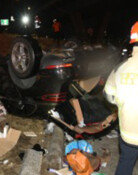[Opinion] Antisocial Crimes
Americans were shocked when Dennis Rader, known as the BTK (Bind-Torture-Kill) strangler, who killed at least 10 women in Kansas, was arrested in February 2005, 31 years after he committed his first crime. They were shocked not only at his horrific crimes but also at the fact that the merciless criminal was a Boy Scout leader, a husband with two children, and a civil servant working for city hall. He was also the president of the Congregation Council at a church that he had attended for 25 years. He appeared to be an average middle-aged man. But he was an antisocial criminal with a double life.
Antisocial criminals, such as arsonists or serial killers, blame their misfortune on society or the government. They tend to express their anger or commit a crime against a large number of randomly chosen people, a cultural asset or a symbolic building to attract public attention. Unfortunately, this type of crime has been on the rise in Korea. Some experts suggest that the problem can be solved with a system or a measure that better protects the underprivileged.
Chae, who is suspected of burning down Sungnyemun, was also an ordinary 70-year-old man in the eyes of his neighbors. A day after he set the nations cultural treasure ablaze, the arsonist peacefully played cards all day long at the town hall. He confessed that he over a dispute regarding land compensation was ignored. Although Chae said that he once considered attacking a train or setting fire to the Royal Ancestral Shrine, he appeared to be more like a person suffering from a personality disorder with antisocial attitude than pyromania.
Chae has previously been convicted of setting Munjeongjeon in Changgyeong Palace on fire in 2006. Considering that he had no criminal record and confessed to that crime, the court sentenced him to a two-year suspended jail term, letting him walk free. The courts have been lenient to arsonists. Out of 679 arson cases in last year, courts have suspended jail terms for 445 of them. The number of arsonists indicted by prosecutors was less than the number of arsonists not prosecuted. It is imperative that antisocial criminals receive a heavy punishment and that a system that constantly monitors potential arsonists be introduced.
Editorial writer Kwon Soon-taek, maypole@donga.com



![[사설]계엄 때보다 낮은 지지율 17%… 국힘의 존재 이유를 묻는 민심](https://dimg.donga.com/c/138/175/90/1/wps/NEWS/IMAGE/2026/02/26/133433702.1.jpg)



